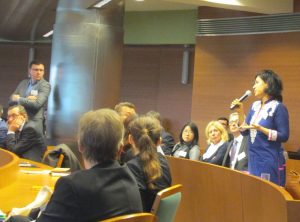Identification of regions and players lagging behind in MOOC Initiatives
 The motivation to establish MOOCs, in Europe, can not be the same as in the other regions of the world. The European dimension of this process, where strategic developments are required, is related to the socio-economic context, the cost of education, the role of the state to define institutional and national trends.
The motivation to establish MOOCs, in Europe, can not be the same as in the other regions of the world. The European dimension of this process, where strategic developments are required, is related to the socio-economic context, the cost of education, the role of the state to define institutional and national trends.
In the paper are presented some of the most important issues related to the enhancement of MOOCs initiatives in Europe, such as the recognition and award of credits, infrastructure and business model, and last but not least adequate adaptation to local cultural and educational context. The regions lagging behind this process are identified and the obstacles and reasons for that are also discussed.
Identification of existing online learning materials with regards to entrepreneurship
 Do you want to know more about entrepreneurship and entrepreneurship education? Do you want to learn about existing online courses devoted to entrepreneurship education? The paper also provides suggestions as to best practices and recommendations to MOOC users interested in expanding their entrepreneurship knowledge and skills. Read more about Entrepreneurship MOOCs.
Do you want to know more about entrepreneurship and entrepreneurship education? Do you want to learn about existing online courses devoted to entrepreneurship education? The paper also provides suggestions as to best practices and recommendations to MOOC users interested in expanding their entrepreneurship knowledge and skills. Read more about Entrepreneurship MOOCs.
Issues for MOOC recognition, certification and accreditation.
 As MOOC’s become more popular, ensuring those who undertake them are able to make the most of the skills they gain, and ensuring appropriate recognition and opportunities to gain accreditation for the learning undertaken, is important. This paper sets out the current context with regards to the recognition, certification and accreditation of MOOC’s within Europe, and explores some of the challenges involved in this area, and considerations for overcoming these challenges as the field grows.
As MOOC’s become more popular, ensuring those who undertake them are able to make the most of the skills they gain, and ensuring appropriate recognition and opportunities to gain accreditation for the learning undertaken, is important. This paper sets out the current context with regards to the recognition, certification and accreditation of MOOC’s within Europe, and explores some of the challenges involved in this area, and considerations for overcoming these challenges as the field grows.
BizMOOC learning design workshop at the Open University UK
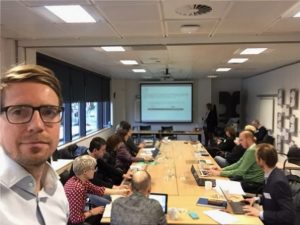 The BizMOOC teams currently meets at the Open University UK facilities in Cardiff, Wales to design and kick-start the production of its 3 Pilot MOOCs.
The BizMOOC teams currently meets at the Open University UK facilities in Cardiff, Wales to design and kick-start the production of its 3 Pilot MOOCs.
We are having an exciting time in identifying the different target audiences, spinning the “word wheel”, creating “personas”, drafting learning outcomes and the course profiles. The MOOCs are going to be implemented towards the end of the year. Besides, we are celebrating the finalization of our first key outcome, the so-called “MOOC BOOK“.
Stay tuned for more information which will follow shortly.
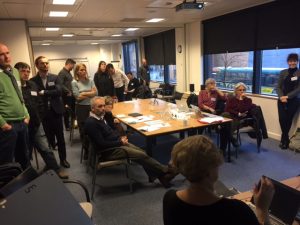
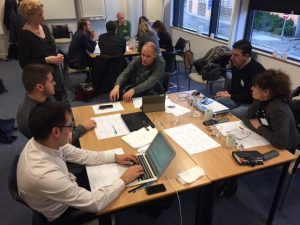
MOOCs and Human Resource Development
 Especially in a global setting, the proper education and development of all the staff is a crucial part of success factors and often a necessity for competitiveness. As a result of this high scale professional goal, educational entities within the company are very complex and often are comparable to public education institutions. Being an innovative company requires offering innovative learning and teaching methods as well. Since MOOCs can be seen as a “new” learning and teaching method, the social components offer new opportunities but also may cause serious threats for companies. Especially data security and work council issues have hindered or are still hindering the usage of such tools. Learn more about these matters.
Especially in a global setting, the proper education and development of all the staff is a crucial part of success factors and often a necessity for competitiveness. As a result of this high scale professional goal, educational entities within the company are very complex and often are comparable to public education institutions. Being an innovative company requires offering innovative learning and teaching methods as well. Since MOOCs can be seen as a “new” learning and teaching method, the social components offer new opportunities but also may cause serious threats for companies. Especially data security and work council issues have hindered or are still hindering the usage of such tools. Learn more about these matters.
Two papers on MOOCs and their role in entrepreneurship education were presented at
3rd International Conference Entrepreneurship for the XXI Century. Images and perspectives
This cyclical conference took place on the 24th and 25th of November 2016 at the Faculty of Management, University of Warsaw and gathered over 100 participants from different parts of the world. There was plenty of possibilities to discussed different faces and aspects of entrepreneurship, and both classical and alternative research perspectives in entrepreneurship. The conference hosted academics from around the world as well as business and politics related people. The topics of interest for presentations and papers included:
- Entrepreneurship research: perspectives, methods, inspirations,
- Entrepreneurial education: theory and practice,
- Entrepreneurial process,
- Context of entrepreneurship and entrepreneurial ecosystem: cultural, legal and institutional conditions for venture creation and development,
- Economic and social factors stimulating entrepreneurial activities,
- Regional determinants of entrepreneurship,
- Innovations and innovation management,
- Enterprise growth and conditions for growth,
- Financial and legal aspects of entrepreneurship,
- Internationalization processes of small and medium companies,
- International entrepreneurship,
- Immigrant entrepreneurship,
- Family business,
- Business models creation, innovation and testing,
- Crisis in the entrepreneurial activities: origins, meanings and answers,
- Small business management – dilemmas and challenges.
Existing MOOC quality models
 Considering the quality of MOOCs, it is essential to guarantee a worthwhile learning experience for the learner and at the same time to reach the goals the provider/institution has for the education provision. MOOCs have become a symbol of a larger modernisation agenda for universities, and are perceived as tools for universities to improve the quality of their blended and online education. Learn more about the different dimensions related to the quality of MOOCs.
Considering the quality of MOOCs, it is essential to guarantee a worthwhile learning experience for the learner and at the same time to reach the goals the provider/institution has for the education provision. MOOCs have become a symbol of a larger modernisation agenda for universities, and are perceived as tools for universities to improve the quality of their blended and online education. Learn more about the different dimensions related to the quality of MOOCs.
Drivers behind MOOCs/reasons to get involved
 MOOCs are increasingly regarded as a way to gain access to higher education. Do you want to learn in your own time and your own pace? Do you want to have access to learning opportunities online that were beyond reach in the past? MOOCs not only provide access to quality educational materials but also help to learn flexibly. Moreover you can connect with people who share the same interests or professional profiles. These are just some of the reasons to get involved. Read more about drivers behind MOOCs.
MOOCs are increasingly regarded as a way to gain access to higher education. Do you want to learn in your own time and your own pace? Do you want to have access to learning opportunities online that were beyond reach in the past? MOOCs not only provide access to quality educational materials but also help to learn flexibly. Moreover you can connect with people who share the same interests or professional profiles. These are just some of the reasons to get involved. Read more about drivers behind MOOCs.
For free or not for free?
 Business models behind MOOCs
Business models behind MOOCs
MOOCs are offered for free and there are monetary costs associated with it – so why do businesses offer them? This dynamic question is tackled in the BizMOOC discussion paper “Existing MOOC business models” which explorers current MOOC business models, costs and potential revenues for various stakeholders and future trends such as “unbundling of education”.
BizMOOC @ Learntec, one of the largest eLearning exhibitions
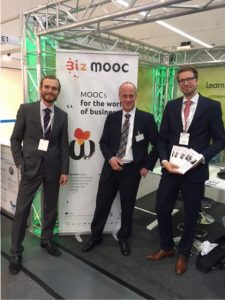 With more than 240 exhibitors, 200 speakers and almost 7.000 visitors, LEARNTEC in Karlsruhe is one of the largest exhibitions for corporate eLearning in Europe. And BizMOOC was part of it!
With more than 240 exhibitors, 200 speakers and almost 7.000 visitors, LEARNTEC in Karlsruhe is one of the largest exhibitions for corporate eLearning in Europe. And BizMOOC was part of it!
Christian Friedl of FH JOANNEUM and Thomas Neumann of AVL used this great opportunity to introduce BizMOOC results, objectives and next steps to different stakeholders such as business clients, eLearning providers, universities and interested learners.
